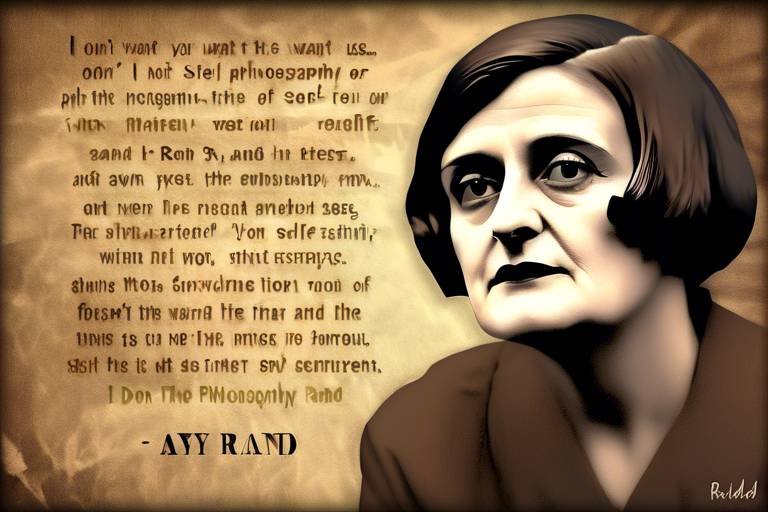Analyzing Kant's Ethics of Duty
When we dive into the realm of ethics, one name that often stands out is Immanuel Kant. His ethical framework, known as Kantian ethics, revolves around the concept of duty, presenting a moral compass that many still reference today. But what exactly does it mean to act out of duty? In a world filled with gray areas and complex moral dilemmas, Kant's philosophy offers a refreshing clarity, urging us to adhere to a universal moral law that transcends personal feelings and situational contexts.
Kant believed that morality is not just about what we feel is right or wrong; it is about following a set of principles that can be universally applied. This is where the idea of the categorical imperative comes into play. Unlike hypothetical imperatives that are conditional and based on personal desires, the categorical imperative demands that we act according to maxims that could be willed as universal laws. Imagine if everyone acted on the same principle—wouldn’t that create a more just and orderly society? This notion of duty calls for a level of consistency in our moral reasoning that is both challenging and inspiring.
As we explore Kant's ethics further, we find ourselves faced with the question: How do we apply these principles in our everyday lives? Whether in personal relationships or professional settings, Kant's ethical framework encourages us to consider our actions carefully. For instance, in a workplace scenario, if you are faced with the temptation to cut corners for personal gain, Kant would argue that you should refrain from doing so, as this would not be a maxim that could be universally accepted. The implications of this are profound, as they challenge us to uphold integrity and respect for others in all our dealings.
However, it’s essential to recognize that Kant's ethics is not without its critics. Some argue that his strict adherence to duty can lead to conflicts when multiple duties arise, leaving individuals grappling with impossible choices. For example, if telling the truth could endanger someone's life, is it still our duty to be honest? This dilemma highlights the potential rigidity of Kantian ethics, prompting discussions about the balance between duty and the consequences of our actions.
In conclusion, analyzing Kant's ethics of duty reveals a robust framework for understanding morality. It challenges us to think critically about our actions and the principles that guide them. While it provides a solid foundation for ethical decision-making, it also opens the door for further debate about the role of consequences and flexibility in our moral judgments. As we navigate our complex world, Kant's emphasis on duty serves as a reminder of the importance of integrity and respect for the inherent worth of every individual.
- What is the categorical imperative? The categorical imperative is a central concept in Kant's ethics that dictates that one should act only according to maxims that can be universally applied.
- How does Kant's ethics apply to modern dilemmas? Kant's ethics encourages individuals to evaluate their actions based on universal principles, promoting integrity and respect for others.
- What are the criticisms of Kantian ethics? Critics argue that Kant's rigid adherence to duty can lead to conflicts and neglect the importance of consequences in moral decision-making.
- Can Kant's ethics be flexible? While Kantian ethics is often seen as rigid, some scholars advocate for a more nuanced approach that considers situational factors and human emotions.

The Foundation of Kantian Ethics
At the heart of Kantian ethics lies the profound idea of duty, which serves as the cornerstone of Immanuel Kant's moral philosophy. Kant believed that true morality is not rooted in the consequences of our actions but rather in the intentions behind them. This perspective shifts the focus from outcomes to the principles that guide our choices, emphasizing that morality is a matter of adhering to a set of universal laws that apply to everyone, everywhere, at all times.
Central to this ethical framework is the categorical imperative, a concept that Kant introduced as a way to evaluate the morality of actions. Unlike hypothetical imperatives, which are conditional and depend on personal desires (like "If you want to be healthy, you should exercise"), the categorical imperative is unconditional and applies universally. This means that when we act, we should do so in a way that we would want our actions to become a universal law applicable to all rational beings.
To further clarify Kant's ethical foundation, let's break down some of its key components:
- Duty: Kant believed that moral actions are those performed out of duty, not out of inclination. This sense of duty is what motivates individuals to act ethically.
- Moral Law: The moral law, according to Kant, is inherent in rational beings. It is discovered through reason and serves as a guide for ethical behavior.
- Autonomy: Kant emphasized the importance of autonomy, asserting that moral agents must act according to their own understanding of the moral law, rather than following external influences.
Kant's emphasis on duty and moral law leads to the idea that ethical behavior is not merely a matter of personal preference or societal norms. Instead, it is about recognizing and adhering to a set of principles that uphold human dignity and respect. Kant’s ethics pushes us to ask ourselves, “What if everyone acted this way?” This question serves as a litmus test for the morality of our actions, compelling us to consider the broader implications of our choices.
Moreover, Kant’s ethics is not just a theoretical framework; it has practical implications for how we navigate moral dilemmas in our daily lives. For instance, when faced with a situation where our personal interests conflict with our duties to others, Kantian ethics urges us to prioritize our duties. This can often feel like a heavy burden, but it is a necessary one if we are to live ethically.
In summary, the foundation of Kantian ethics rests on the principles of duty and the categorical imperative, which together form a robust framework for understanding morality. By placing duty at the forefront, Kant encourages us to act in ways that respect the inherent worth of all individuals, challenging us to uphold our moral obligations regardless of the circumstances. This ethical approach not only shapes individual behavior but also has the potential to influence societal norms, encouraging a culture of respect and accountability.
- What is the categorical imperative? The categorical imperative is a central concept in Kantian ethics that serves as a universal moral law, guiding individuals to act in ways that could be universally adopted.
- How does Kant define duty? Kant defines duty as the necessity to act according to moral law, regardless of personal inclinations or desires.
- What is the significance of autonomy in Kant's ethics? Autonomy is crucial in Kant's ethics because it emphasizes the importance of individuals making moral decisions based on their understanding of the moral law, rather than external pressures.

The Categorical Imperative Explained
The categorical imperative is the cornerstone of Kant's ethical philosophy, serving as a guiding principle for moral action. Unlike hypothetical imperatives, which are conditional and depend on personal desires or goals, the categorical imperative is absolute and applies universally to all rational beings. This means that it demands action based on reason, rather than emotion or social conventions. Imagine standing at a moral crossroads, where every decision you make could either uphold or undermine the moral fabric of society. The categorical imperative acts like a compass, pointing you toward the path of duty and ethical integrity.
At its core, the categorical imperative revolves around two fundamental principles: universalizability and respect for persons. Universalizability suggests that one should only act according to maxims that can be willed as universal laws. In simpler terms, if you believe that a particular action is morally acceptable for you, it should be acceptable for everyone in similar situations. For example, if you think it's okay to lie to get out of trouble, then you must accept that everyone else should be allowed to lie as well. This creates a slippery slope of moral chaos, which Kant aims to avoid.
The second principle, respect for persons, asserts that individuals must be treated as ends in themselves and never merely as means to an end. This is a powerful assertion that highlights the inherent dignity and worth of every individual. Think about it: when you use someone solely to achieve your own goals, you strip them of their humanity. Kant's ethics compel us to recognize the intrinsic value of each person, urging us to consider how our actions impact others. This principle serves as a reminder that our moral obligations extend beyond ourselves, fostering a sense of community and mutual respect.
To illustrate these principles further, let's break down the categorical imperative into its various formulations:
| Formulation | Description |
|---|---|
| Universal Law Formulation | Act only according to that maxim whereby you can at the same time will that it should become a universal law. |
| Ends in Themselves Formulation | Act in such a way that you treat humanity, whether in your own person or in the person of any other, always at the same time as an end and never merely as a means. |
These formulations provide a robust framework for ethical decision-making. They challenge us to reflect on our actions and their implications, pushing us to ask ourselves whether we would want our actions to become a universal standard. The beauty of Kantian ethics lies in its insistence on rationality and consistency, urging us to rise above personal biases and societal pressures.
In everyday life, applying the categorical imperative can be transformative. It encourages us to think critically about our choices, whether in our personal relationships or in the workplace. For instance, when faced with the temptation to cut corners at work, the categorical imperative would prompt you to consider whether you would want such behavior to be accepted universally. Would you want every employee to prioritize personal gain over collective integrity? This kind of reflective thinking not only enhances personal accountability but also promotes a culture of ethical behavior.
Ultimately, the categorical imperative serves as a moral touchstone, reminding us that our actions resonate beyond our immediate circumstances. By embracing this ethical framework, we can navigate the complexities of moral dilemmas with clarity and conviction, fostering a more just and respectful society.
- What is the categorical imperative? The categorical imperative is a fundamental principle in Kant's ethics that dictates that one should act only according to maxims that can be universalized.
- How does the categorical imperative differ from hypothetical imperatives? Hypothetical imperatives are conditional and depend on personal desires, while categorical imperatives are unconditional and apply universally.
- Why is respect for persons important in Kantian ethics? Respect for persons emphasizes the inherent dignity and worth of individuals, urging us to treat others as ends in themselves rather than merely as means to an end.

When we dive into the world of Kantian ethics, we encounter the categorical imperative, a cornerstone of his moral philosophy. Kant didn't just throw this term around; he meticulously defined various formulations of it to clarify how we should approach our ethical duties. At its core, the categorical imperative serves as a litmus test for moral actions, guiding us to reflect on the broader implications of our choices. Let's explore the primary types of categorical imperatives that Kant outlined, each providing a unique lens through which we can analyze our moral obligations.
The first and perhaps most famous formulation is the Universal Law Formulation. This principle urges us to act only according to maxims that we can will to become universal laws. Imagine a world where every action you take becomes a universal standard—would you still choose to act in that way? This formulation encourages us to consider the consistency of our actions. If your action can’t be universally applied without contradiction, then it fails the test of morality. For instance, if you think it’s okay to lie to get out of trouble, ask yourself: What if everyone lied whenever they found themselves in a jam? The fabric of trust would unravel, leading to chaos. This is why Kant emphasizes that our maxims should be capable of being universalized without leading to contradictions.
Next, we have the Ends in Themselves Formulation. This perspective is particularly powerful because it emphasizes the inherent dignity of every individual. Kant asserts that we must treat others as ends in themselves and never merely as means to an end. This means respecting the autonomy and worth of every person. For example, consider a scenario where a company exploits its workers for profit. Here, the workers are treated as mere tools for financial gain, violating this ethical principle. In a Kantian framework, exploiting individuals for any purpose is unacceptable because it disregards their humanity. This formulation serves as a reminder that every person has intrinsic value, and our actions should reflect that respect.
In addition to these two major formulations, Kant’s philosophy also hints at other interpretations of the categorical imperative. While he primarily focused on the two mentioned, thinkers and ethicists have expanded on his ideas, exploring how these formulations can be applied in various contexts. For instance, some argue that the categorical imperative can help navigate complex social issues, such as justice and equality, by providing a moral compass that prioritizes human dignity and universal principles.
To summarize, the types of categorical imperatives that Kant presents are not just abstract concepts; they are practical tools for navigating the murky waters of ethical decision-making. They challenge us to reflect on our actions and their implications, promoting a moral framework that values consistency and respect for individuals. By internalizing these formulations, we can better understand our duties and responsibilities in both personal and societal contexts.
- What is a categorical imperative?
A categorical imperative is a universal moral law that guides ethical decision-making, emphasizing the importance of duty and respect for individuals. - How does the Universal Law Formulation work?
This formulation requires individuals to act only according to maxims that can be universally applied, ensuring consistency in moral reasoning. - What does it mean to treat others as ends in themselves?
This principle emphasizes respecting the inherent dignity of individuals, ensuring they are not used merely as means to achieve an end. - Can Kant's ethics be applied to modern dilemmas?
Yes, Kant's ethical framework can be applied to various contemporary issues, providing a basis for addressing moral dilemmas in personal and professional contexts.

The Universal Law Formulation is one of the most significant aspects of Immanuel Kant's ethical philosophy. At its core, it suggests that we should act only according to maxims that we can will to become universal laws. This means that before we take any action, we should consider whether our behavior could be adopted universally without contradiction. Imagine if everyone acted in the same way; would that lead to a harmonious society, or would chaos ensue? This reflective process encourages us to think critically about the implications of our actions.
Kant believed that this approach to ethics fosters consistency in moral reasoning. For instance, if you think it’s acceptable to lie in certain situations, you must ask yourself: what if everyone lied? If lying became a universal law, trust would erode, and communication would break down. Thus, the Universal Law Formulation compels us to evaluate the broader consequences of our actions on society as a whole.
Additionally, Kant’s formulation highlights the importance of intention behind actions. It’s not enough to simply act; our motives must align with a sense of duty. When we act out of a sense of obligation—rather than for personal gain—we contribute to a moral society. This perspective posits that our actions should be guided by principles that uphold human dignity and respect. In this way, the Universal Law Formulation serves as a moral compass, directing us toward ethical behavior that transcends personal desires.
To illustrate this concept further, consider the following example: suppose you are in a situation where you could easily cheat on a test. The maxim might be, "It’s okay to cheat if I can get away with it." However, when applying the Universal Law Formulation, you must ask: what if everyone adopted this maxim? The result would likely be a breakdown of the educational system, where degrees lose their value, and genuine effort is overshadowed by deceit.
In summary, the Universal Law Formulation is a powerful tool in Kantian ethics, urging us to evaluate our actions through the lens of universality. By doing so, we not only uphold our moral duties but also contribute to a society grounded in mutual respect and ethical integrity. This formulation challenges us to think beyond our immediate desires and consider the long-term implications of our choices, fostering a more conscientious approach to ethical decision-making.
- What is the Universal Law Formulation?
The Universal Law Formulation is a principle in Kantian ethics that states we should act only according to maxims that can be willed as universal laws.
- Why is it important?
It helps ensure that our actions are consistent and ethical, promoting a moral society where everyone is treated with respect.
- Can you give an example of applying this formulation?
Sure! If you consider cheating on a test, you must think about whether it would be acceptable if everyone did the same. The answer likely leads to the conclusion that it would not be.

The Ends in Themselves formulation of Kant's categorical imperative is a profound principle that emphasizes the intrinsic value of every individual. According to Kant, every person should be treated not merely as a means to an end, but as an end in themselves. This formulation serves as a powerful reminder that human dignity is paramount and that ethical considerations must account for the worth of individuals beyond their utility. Imagine a world where people are seen as mere tools to achieve goals; it would be a place devoid of respect and compassion. Instead, Kant urges us to recognize that each person possesses inherent value simply by being human.
This perspective forces us to reevaluate our interactions and decisions. For instance, in a workplace setting, treating employees as mere resources for profit undermines their dignity and can lead to a toxic environment. By applying the Ends in Themselves formulation, employers are encouraged to foster a culture of respect and recognition, where each individual's contributions are valued. This not only enhances morale but also promotes a more ethical and productive workplace.
Furthermore, this formulation highlights the importance of moral responsibility. It challenges us to consider the impact of our actions on others. When faced with ethical dilemmas, such as whether to cut corners for profit or uphold standards that respect individuals, the Ends in Themselves principle compels us to prioritize human dignity. In doing so, we nurture a sense of community and interconnectedness, recognizing that our choices resonate far beyond our immediate surroundings.
To illustrate this concept further, consider the following scenarios:
| Scenario | Treating as Means | Treating as Ends |
|---|---|---|
| Employee Relations | Using employees solely for profit maximization. | Investing in employee well-being and development. |
| Consumer Interaction | Exploiting customers for sales. | Building relationships based on trust and respect. |
| Community Engagement | Utilizing community resources without regard. | Supporting community initiatives and fostering collaboration. |
In each of these cases, the choice to treat individuals as ends in themselves fosters a more ethical approach to decision-making. It encourages a shift from a transactional mindset to one rooted in respect and empathy. As we navigate the complexities of modern life, embracing this formulation can lead to more meaningful interactions and a stronger sense of moral obligation towards others.
Ultimately, the Ends in Themselves formulation is not just a theoretical concept; it is a call to action. It invites us to reflect on our values and the way we treat others, urging us to create a world where everyone is acknowledged for their inherent worth. By adopting this ethical framework, we can contribute to a more just and compassionate society, where respect for individuals is at the forefront of our moral considerations.
- What does it mean to treat someone as an end in themselves?
Treating someone as an end in themselves means recognizing their inherent worth and dignity, valuing them for who they are rather than what they can provide.
- How does the Ends in Themselves formulation apply in business?
In business, this formulation encourages companies to prioritize employee welfare and customer relationships over mere profit, fostering a more ethical corporate culture.
- Can the Ends in Themselves principle coexist with utilitarianism?
While Kant's ethics focus on duty and intrinsic value, utilitarianism emphasizes outcomes. Balancing both can be complex, but it is possible to consider the well-being of individuals while also assessing the consequences of actions.

Kantian ethics is not just a philosophical curiosity; it has profound implications for how we navigate the complexities of modern life. Imagine you're faced with a moral dilemma at work, such as whether to report a colleague for unethical behavior. Kant's framework offers a clear lens through which to view your options, urging you to consider your duty to uphold honesty and integrity. This emphasis on duty can sometimes feel like a heavy weight, but it also provides a solid foundation for making ethical decisions.
In practical terms, applying Kantian ethics means consistently asking yourself, "What would happen if everyone acted this way?" This question is central to Kant's categorical imperative and serves as a guiding principle in various situations. For instance, if you contemplate lying to get out of a sticky situation, Kant would challenge you to consider the broader implications of such an action. Would a world where everyone lies be sustainable? The answer is likely no, which reinforces the importance of truthfulness as a moral obligation.
Moreover, Kantian ethics extends beyond individual actions; it can influence societal norms and laws. For example, consider issues like human rights or environmental ethics. Kant's principle of treating individuals as ends in themselves underlines the necessity of respecting each person's dignity and worth. This perspective can lead to stronger advocacy for policies that protect marginalized groups or promote sustainable practices. By viewing these issues through a Kantian lens, we recognize that our obligations extend beyond personal gain to encompass the well-being of others and the planet.
However, applying Kant's ethics is not without its challenges. Real-life scenarios often involve competing duties, which can create moral conflicts. For instance, you might have a duty to protect a friend’s privacy while also feeling a responsibility to report their harmful actions. In such cases, Kantian ethics encourages a rigorous examination of the maxims guiding your decisions. Are they universalizable? Do they respect the intrinsic value of all individuals involved? This reflective process can help clarify your obligations and guide you toward a resolution.
In summary, the application of Kantian ethics provides a robust framework for addressing ethical dilemmas in various contexts, from personal relationships to global issues. By focusing on duty and the categorical imperative, we can navigate the murky waters of morality with greater clarity and purpose. As we engage with these principles, we not only refine our own ethical understanding but also contribute to a more just and respectful society.
- What is the main idea behind Kant's ethics? Kant's ethics centers on the concept of duty and the categorical imperative, which serves as a universal moral law guiding human actions.
- How can Kantian ethics be applied in daily life? It can be applied by evaluating actions based on whether they can be universalized and whether they respect the dignity of all individuals involved.
- What are some criticisms of Kantian ethics? Critics argue that Kant's approach is too rigid and neglects the importance of consequences in moral decision-making.
- How does Kantian ethics relate to modern ethical dilemmas? It provides a structured way to analyze moral issues, emphasizing consistency and respect for individuals, which is crucial in today's complex ethical landscape.

Immanuel Kant's ethical framework has been a cornerstone of moral philosophy, yet it has not been without its critics. One of the most significant critiques revolves around the rigidity of his duty-based ethics. Kant's insistence on adhering strictly to moral laws, as articulated through the categorical imperative, can lead to situations where following duty results in outcomes that many would deem morally questionable. For instance, imagine a scenario where telling the truth, as mandated by duty, could lead to harm or suffering. Critics argue that this unwavering commitment to duty can sometimes overshadow the nuances of human experience, making it difficult to navigate complex ethical landscapes.
Moreover, the potential for conflicts between duties raises further concerns. Kant's framework does not provide a clear resolution for situations where two moral duties clash. For example, if one has a duty to protect a friend and another duty to report a crime, the rigid adherence to duty can create a moral quandary. This lack of flexibility has led some philosophers to question the practicality of Kant's ethical system in real-world applications. They argue that a more adaptable approach might better accommodate the complexities of human relationships and societal norms.
Another notable critique centers on the role of consequences in ethical decision-making. Kant's deontological approach prioritizes the intention behind an action over its outcomes, which many find problematic. Critics contend that ignoring the consequences can result in actions that are, in practical terms, harmful or unjust. They argue that a balanced ethical framework should consider both duties and the potential results of actions. For instance, if a doctor refuses to lie to a patient about a terminal illness due to a duty to be truthful, the emotional distress caused may lead to a significant debate about the ethical implications of such honesty.
Furthermore, the inflexibility of Kant's ethics has led some to advocate for a more nuanced approach to moral decision-making. They argue that incorporating situational factors and human emotions into ethical considerations can provide a richer understanding of morality. For instance, in a case where a lie might prevent emotional suffering, a more flexible ethical framework might allow for exceptions to the rule of honesty. This perspective emphasizes that ethics should evolve with societal changes and human experiences, rather than remain static and prescriptive.
In summary, while Kant's ethics offers a robust framework for understanding moral duty, its critiques highlight significant challenges. The rigidity of duty, potential conflicts between moral obligations, and the neglect of consequences all invite a deeper discussion about the nature of ethics. As society continues to grapple with complex moral dilemmas, the conversation surrounding Kant's contributions remains vital, pushing us to explore how we can blend duty with a more flexible understanding of ethical responsibilities.
- What is the main critique of Kant's ethics? The main critique is its rigidity, which can lead to morally questionable outcomes by prioritizing duty over consequences.
- How does Kant's ethics handle conflicting duties? Kant's framework struggles with conflicting duties, as it does not provide clear resolutions for such situations.
- Why is the role of consequences important in ethics? Considering consequences is crucial because it helps evaluate the practical implications of actions, which can affect overall moral judgments.
- Can Kant's ethics be adapted for modern dilemmas? While Kant's ethics is rigid, some philosophers advocate for a more nuanced approach that considers situational factors and human emotions.

When it comes to ethics, the debate between Kant's deontological approach and consequentialist theories is as vibrant as a bustling marketplace. Kant argues that morality is rooted in duty and adherence to universal laws, but what about the outcomes of our actions? Critics often raise a valid point: should we really ignore the consequences of our actions when they can have a profound impact on people's lives? This brings us to the crux of the matter—can duty stand alone, or must it be balanced with the results of our decisions?
Imagine you're at a crossroads, faced with a moral dilemma. On one side, you have a strict duty to tell the truth, while on the other, lying could save a life. Kant would argue that the act of lying is inherently wrong, regardless of the potential positive outcome. This perspective can feel rigid and even heartless, as it seems to disregard the human element in ethical decision-making. Critics of Kantian ethics suggest that a more flexible approach, which considers the consequences, might lead to better moral outcomes.
To illustrate this, let's consider a few examples:
- Example 1: A doctor has a patient with a terminal illness who is in severe pain. The doctor knows that providing a lethal dose of medication could end the patient's suffering. Kant's ethics would argue against this action, focusing solely on the duty to preserve life, while a consequentialist might support it, emphasizing the relief of suffering.
- Example 2: A whistleblower discovers that their company is polluting the environment. They face a choice: remain silent (fulfilling their duty to their employer) or speak out (potentially harming their job security but benefiting the public good). Here again, the consequences of their actions weigh heavily on the moral scale.
These examples highlight a critical tension in ethical philosophy: the struggle between adhering to duty and considering the broader implications of our actions. While Kant's ethics provides a strong foundation for moral reasoning, it can sometimes feel like a straightjacket in situations that demand compassion and understanding. This rigidity raises questions about whether strict adherence to duty is practical in a world where human lives are at stake.
Furthermore, the role of consequences in ethical decision-making prompts us to consider the following questions: Is it enough to act out of duty when the results could lead to harm? Can we truly separate the morality of an action from its outcome? These inquiries invite a more nuanced exploration of ethics, one that recognizes the complexity of human experience and the multifaceted nature of moral dilemmas.
Ultimately, while Kant's emphasis on duty is invaluable, it is essential to acknowledge the role of consequences in shaping our ethical landscape. A balanced approach that considers both duty and outcomes may lead to a more compassionate and effective ethical framework, one that aligns with our shared humanity.
- What is Kant's main ethical principle? Kant's main ethical principle is the categorical imperative, which dictates that one should act only according to maxims that can be willed as universal laws.
- How does Kantian ethics differ from consequentialism? Kantian ethics focuses on the morality of actions based on duty and adherence to moral laws, while consequentialism evaluates actions based on their outcomes and the overall good they produce.
- Can Kantian ethics be applied to modern dilemmas? Yes, Kantian ethics can be applied to contemporary ethical dilemmas, providing a framework for decision-making that emphasizes moral duty and respect for individuals.
- What are some criticisms of Kant's ethics? Critics argue that Kant's ethics can be too rigid, neglecting the importance of consequences and failing to account for the complexities of human emotions and situations.

When we dive into the world of ethics, particularly Kant's moral philosophy, we often find ourselves at a crossroads. Kant's strict adherence to duty and the categorical imperative can feel like a rigid framework, almost like a straightjacket for moral reasoning. But here's the kicker: life is rarely black and white. Imagine navigating a bustling city with only a map of the main roads; you might miss the hidden gems and shortcuts that could make your journey more enriching. This analogy perfectly encapsulates the need for flexibility in moral decision-making.
Critics of Kantian ethics argue that the philosopher's deontological approach, which emphasizes duty over consequences, can lead to morally questionable outcomes. For instance, consider a scenario where telling the truth could result in harm to another person. Kant would insist on honesty as a duty, but what about the potential fallout? This raises a critical question: should we not also consider the consequences of our actions when making ethical decisions? In a world that often demands quick thinking and adaptability, a strict adherence to duty may overlook the nuances of real-life situations.
Moreover, the human experience is deeply intertwined with emotions, relationships, and context. For example, if a friend confides in you about a mistake they made, you might feel torn between your duty to uphold honesty and your desire to protect their feelings. Here, the inflexibility of Kant's ethics could lead to a harsh truth that might damage a valuable relationship. This highlights the necessity for a more nuanced approach to ethics—one that allows for emotional intelligence and situational awareness.
Incorporating flexibility into moral decision-making does not mean abandoning duty altogether. Instead, it suggests a balance between duty and the complexities of human experience. This could involve asking ourselves reflective questions such as:
- What are the potential consequences of my actions?
- How might my decision affect the people involved?
- Can I find a way to honor my duty while also considering the emotional context?
By allowing for flexibility, we can navigate ethical dilemmas with a more comprehensive understanding, weighing both our duties and the potential outcomes. This approach acknowledges that while Kant's principles provide a solid foundation for moral reasoning, they must be applied with an awareness of the human condition—complex, messy, and beautifully imperfect.
- What is the main criticism of Kant's ethics? Many critics argue that Kant's rigid approach does not account for the consequences of actions, which can lead to morally questionable outcomes.
- How can flexibility improve moral decision-making? Flexibility allows individuals to consider the context and emotional impact of their decisions, leading to more compassionate and nuanced ethical choices.
- Is it possible to balance duty and consequences in ethics? Yes, finding a balance involves reflecting on both one's duties and the potential consequences of actions, allowing for a more comprehensive ethical framework.
Frequently Asked Questions
- What is the main principle of Kant's ethics?
The core principle of Kant's ethics revolves around the concept of duty. Kant believed that moral actions are not based on outcomes but on adherence to a universal moral law, which he termed the categorical imperative. This imperative guides individuals to act according to maxims that can be universally applied.
- How does the categorical imperative work?
The categorical imperative serves as a method for evaluating moral actions. It emphasizes that one should only act according to maxims that could be willed as universal laws. This means that if an action cannot be universally applied without contradiction, it is deemed immoral. Essentially, it’s about consistency and fairness in moral reasoning.
- What are the different formulations of the categorical imperative?
Kant identifies several formulations of the categorical imperative. The most notable are the Universal Law Formulation, which focuses on maxims that can be made universal, and the Ends in Themselves Formulation, which asserts that individuals should always be treated as ends in themselves, recognizing their inherent dignity and worth.
- Can Kantian ethics be applied to modern ethical dilemmas?
Absolutely! Kant's ethical framework can be applied to various contemporary scenarios, such as business ethics, medical ethics, and social justice issues. By adhering to the principles of duty and respect for individuals, one can navigate complex moral dilemmas while maintaining a strong ethical foundation.
- What are some criticisms of Kant's ethics?
Some common criticisms include its perceived rigidity and the potential for conflicts between duties. Critics argue that Kant's deontological approach may overlook the importance of consequences in moral decision-making, leading to situations where following duty may result in negative outcomes.
- Is there flexibility in Kant's ethical framework?
While Kant's ethics is often seen as inflexible, some scholars advocate for a more nuanced approach. They suggest incorporating situational factors and human emotions into moral judgments, allowing for a balance between duty and the consequences of actions.



















